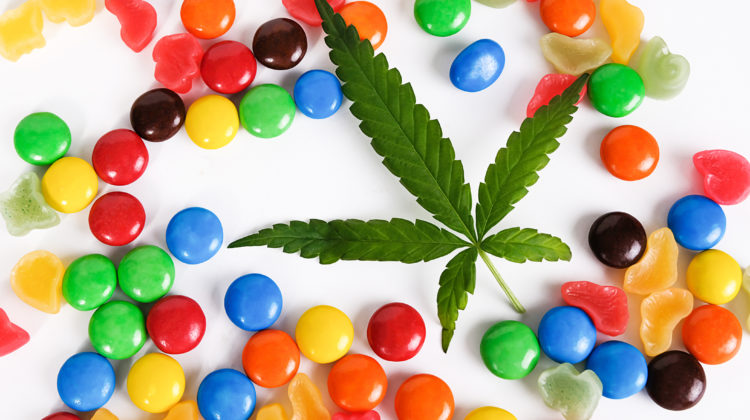
Infused imitations like “medicated Skittles” are eye-catching, but are brands piggybacking? Photo credit: Shutterstock.
Combining munchies with the high may be a clever marketing strategy to gain customers. But the use of established brands in the sale of cannabis-infused edibles can also be a commercial liability.
In May 2021, candy-manufacturing titan Mars Wrigley filed lawsuits in California and Illinois federal courts against cannabis operators who sell cannabis products that allegedly infringe on its Skittles, Starburst and Life Savers trademarks.
Trademark infringement, according to the U.S. Patent and Trademark Office, is “the unauthorized use of a trademark or service mark on or in connection with goods and/or services,” in a way that may deceive or confuse customers about the origin of the products.
“Mars Wrigley strongly condemns the use of popular candy brands in the marketing and sale of THC products, which is grossly deceptive and irresponsible,” the conglomerate, which does not manufacture or market any products containing cannabis, wrote in a statement.
Familiarity Sells
The issue is one of branding. For recreational and younger customers, trademarked treats catch their attention.
“You enjoyed the products, maybe as a child, so why not have a version that also gets you high? You already know what it tastes like,” Evan Dymond, a senior at Occidental College in Los Angeles, said.
Brands like Skittles are popular with customers in part due to their characteristic, tropical taste. Because cannabis-infused edibles have a reputation for bitterness, imitations of candies offer a palatable alternative for consumers, Dymond said.
Ishaani Gokli, also a senior at Occidental College, has a sweet tooth. Although smoking is her preferred method of consumption, she began by experimenting with baking and buying edibles. When it came to the latter, she said, colorful knock-offs were everywhere.
“This really grabs the 18-year-old Californian market. Marketing does make a difference,” Gokli said. “If I saw an infused Snickers; I like Snickers, and I’d probably go pick it up.”
Standing out in a Saturated Market
Marketing cannabis-infused edibles is about more than taste alone. Packaging, too, is key. For companies who are uncertain of how to market their variants, the nostalgia of Mars Wrigley’s fruit-flavored candies can be too desirable not to imitate.
“Companies want to piggyback off something that is familiar. So they’ll use those big brands,” Marissa Figueroa, assistant logistics supervisor at the Phoenix-based dispensary, Arizona Organix, said.
As such, in a freshly legal and growing cannabis industry, smaller businesses may use cartoonish hues and vibrant graphics to compete, Figueroa said.
But, in response, Mars Wrigley has taken significant action to preserve its intellectual property and enforce child safety restrictions.
“The use of Mars Wrigley’s brands in this manner […] must cease, especially to protect children from mistakenly ingesting these unlawful THC products,” the company stated in a press release.
Filed in Chicago, one complaint alleges the California company Terphogz used the name “Zkittlez” and a derivative of Mars Wrigley’s “Taste the Rainbow” slogan to promote its strain and other merchandise, to the tune of a 20% premium in the market.
Wrigley sued Terphogz — which now uses “The Original Z” instead of Zkittlez — for trademark infringement, among other claims.
‘If we Can’t do it, Nobody can’
In Southern California, another federal lawsuit by Mars Wrigley seeks to desist the presence of online retailers offering products like “Medicated Skittles,” and “Life Savers Medicated Gummies.”
If Mars wins these cases, defendants may be forced to close their digital shops, according to the suit.
Some cannabis consumers have called into question the intent behind Mars Wrigley’s litigations.
“Over the past 50 years, we’ve seen how corporations have taken part in the criminalization of cannabis,” said one college student in California, who asked to remain anonymous because she is involved in an on-campus program that prohibits cannabis use. “Now, as we move into an era where it is becoming more profitable to invest in cannabis, I think that this is one of the corporation’s ways of saying they don’t want people to make a profit off it if they can’t do it themselves.”
A Reckoning Over Legitimacy
Creators of commercial cannabis products have faced a reckoning over strain names and infringement.
Over the years, operators have changed strain names like “Skywalker OG,” and “Bruce Banner,” for example, Leafly reports.
“They are borrowing the names of the brands to sell a commercial product, but in a way that could not plausibly be framed as a parody,” Erik Ugland, associate professor of media law at Marquette University in Milwaukee, Wisconsin, wrote in an email. “This isn’t like a parody product where the parody is the value-added component that people are paying more money to obtain or experience. Here, the use of the existing candy brands is used strictly as a gimmick to enhance sales of the underlying product.”
In other words, packaging creates a false impression. That influences consumers to believe that Mars Wrigley makes cannabis products, Ugland added.
But, it may have the opposite effect on some consumers that see an infused Starburst and think ‘that’s not right.’
For that reason, Evan Dymond, senior at Occidental College, remains cautious when shopping for edibles online or at dispensaries.
“If I see something branded as, like, a legit candy bar but it’s got weed in it; I know it’s not regulated,” Dymond said.
Gokli, also a student at Occidental, echoed that sentiment. Although she admitted she increasingly relies upon brand recognition to inform her choices in a crowded edibles market. While she has not purchased infused Skittles, Starburst or Life Savers, she has tried other candy knock-offs such as Nerds.
“I don’t think Nerds is producing cannabis ropes,” Gokli laughed. “But I’m checking everything out that is available legally to me, and (imitations) definitely caught my eye.”


Leave a Reply